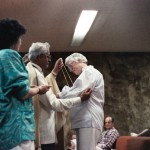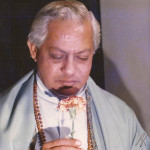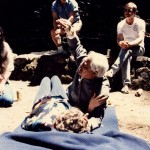The first aspect of Niyama is Sochia – that’s a Sanskrit word which means ‘inner and outer cleanliness’, inner and outer cleanliness.
Now the outer cleanliness does not necessarily refer to the body, although it’s part of it, but outer in this sense could also me environment, a nd how we react to the environment. Inner cleanliness necessarily involves right thinking.
A person that has wrong thinking, can never be clean inside. I was reading a form this evening, a review report, and this person just wrote two, three words, four words, and they were so beautiful, I was so touched.
That is a secret – this person said, ‘Through my practices I feel clean inside’. Beautiful. I cried. Tears came out of my eyes. How beautiful it is to feel clean inside? How do we become clean inside? Right action, right thought, right feeling.

We can curb many of the things that happen in our lives. So we have inner and outer cleanliness. Now, if we practise Yama properly, with non-violence, truthfulness, Asteya, Brahmacharya and Aparigraha, then automatically, all these things are so interlinked, automatically we feel clean inside and outside.

To be contented in whatever circumstances we are placed in. Now we know that if it rains twice someone says, ‘Oh, it’s raining’. If it’s too hot, ‘It’s too hot!’ What a sad state of affairs.
Feel contented. Feel contented. We spoke this morning, we spoke this morning that what ever happens to us is of our own doings.
And let me be contented in acceptance, not contented in sitting back and not doing anything about it, but contented in acceptance that this is my lot, and I accept this lot and not worry about it and get nervous breakdowns. That is an aspect of contentment. So Niyama contains contentment.
Now Santosha also means keeping an equanimity in all that happens around us, pleasure and pain. Now if we have developed in Yama the sense of non-attachment then we can find contentment, for then pleasure and pain will be viewed objectively and would not have a binding karmic effect upon us.
Our problem is that we heap karma upon karma – bad or good, both are binding. But if it can be viewed objectively then it becomes non-binding. And anything which is non-binding, can never add on to karma, and all karma one has to pay for.
Whatever you sow you must reap. You know that.








Speak Your Mind